Corsair's Force SSD Reviewed: SF-1200 is Very Good
by Anand Lal Shimpi on April 14, 2010 2:27 AM ESTOverall System Performance using PCMark Vantage
Next up is PCMark Vantage, another system-wide performance suite. For those of you who aren’t familiar with PCMark Vantage, it ends up being the most real-world-like hard drive test I can come up with. It runs things like application launches, file searches, web browsing, contacts searching, video playback, photo editing and other completely mundane but real-world tasks. I’ve described the benchmark in great detail before but if you’d like to read up on what it does in particular, take a look at Futuremark’s whitepaper on the benchmark; it’s not perfect, but it’s good enough to be a member of a comprehensive storage benchmark suite. Any performance impacts here would most likely be reflected in the real world.
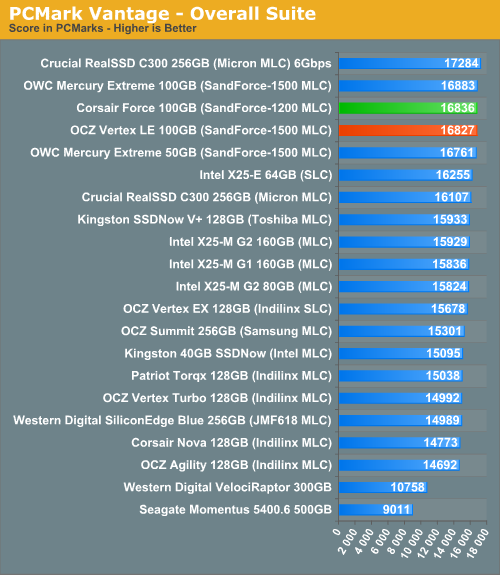
Real world performance is very competitive. Corsair's Force is easily in the top 3 for best performing SSDs on the market today.
The memories suite includes a test involving importing pictures into Windows Photo Gallery and editing them, a fairly benign task that easily falls into the category of being very influenced by disk performance.
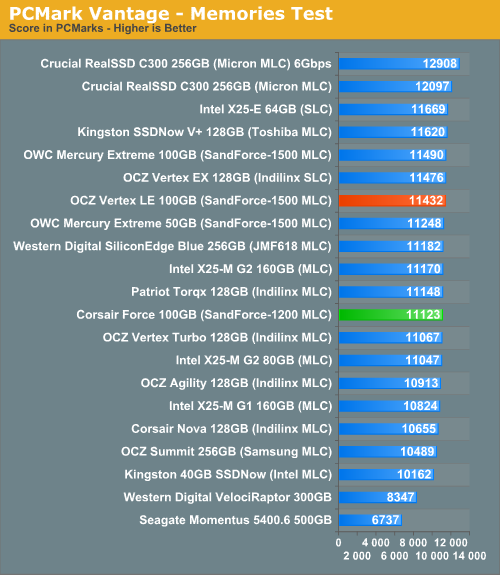
The TV and Movies tests focus on on video transcoding which is mostly CPU bound, but one of the tests involves Windows Media Center which tends to be disk bound.
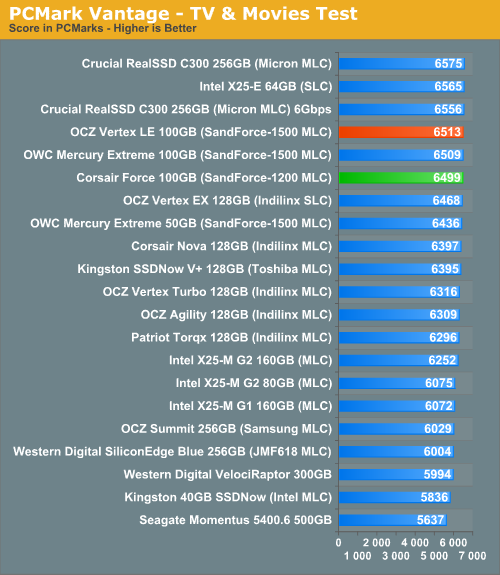
The gaming tests are very well suited to SSDs since they spend a good portion of their time focusing on reading textures and loading level data. All of the SSDs dominate here, but as you'll see later on in my gaming tests the benefits of an SSD really vary depending on the game. Take these results as a best case scenario of what can happen, not the norm.
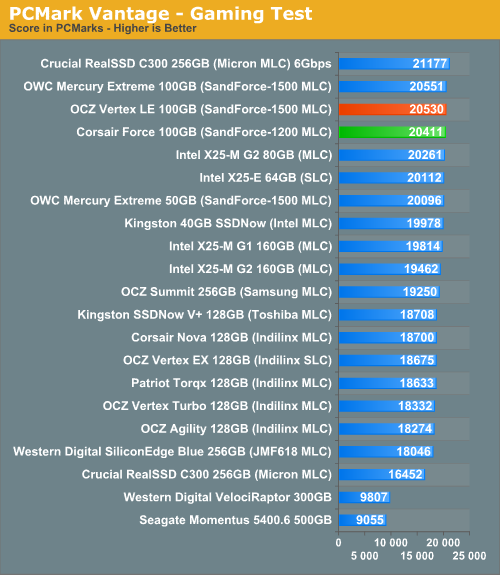
In the Music suite the main test is a multitasking scenario: the test simulates surfing the web in IE7, transcoding an audio file and adding music to Windows Media Player (the most disk intensive portion of the test).
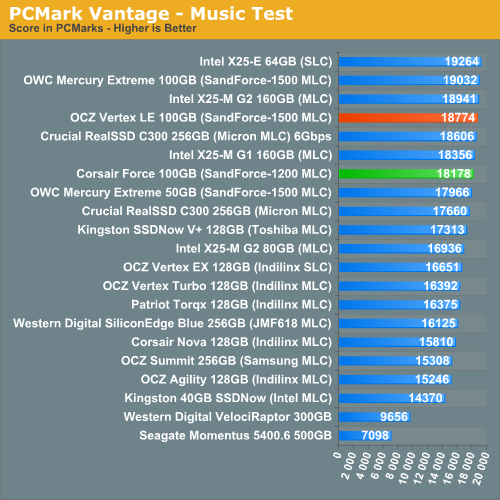
The Communications suite is made up of two tests, both involving light multitasking. The first test simulates data encryption/decryption while running message rules in Windows Mail. The second test simulates web surfing (including opening/closing tabs) in IE7, data decryption and running Windows Defender.
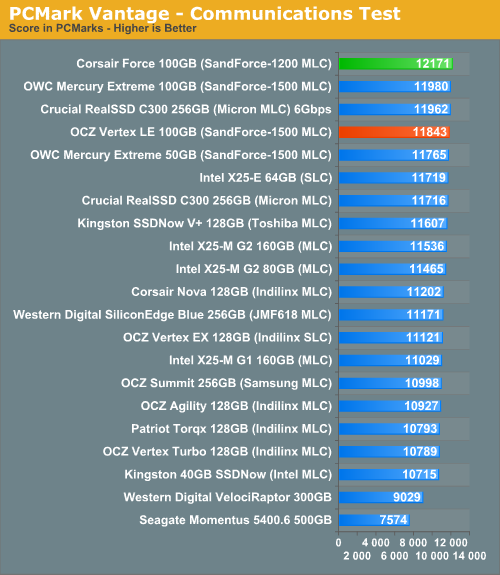
I love PCMark's Productivity test; in this test there are four tasks going on at once, searching through Windows contacts, searching through Windows Mail, browsing multiple webpages in IE7 and loading applications. This is as real world of a scenario as you get and it happens to be representative of one of the most frustrating HDD usage models - trying to do multiple things at once. There's nothing more annoying than trying to launch a simple application while you're doing other things in the background and have the load take forever.
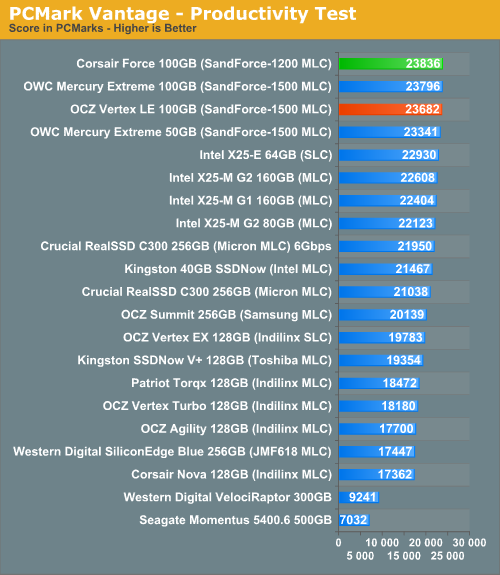
The final PCMark Vantage suite is HDD specific and this is where you'll see the biggest differences between the drives:
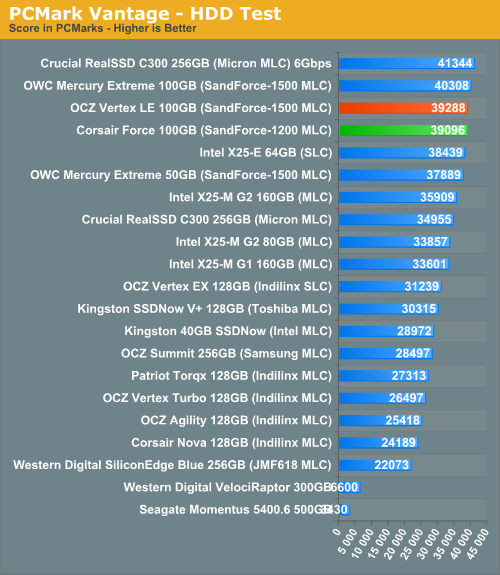










63 Comments
View All Comments
Chloiber - Wednesday, April 14, 2010 - link
Just to show you what I mean.I created an 512kb seq. write IOMeter test pattern which writes to a space of 1GB. When you use IOMeter for the first time, it creates that 1GB file to reserve the space. I then stopped the test as soon as the 1GB file was written and before the actual test even began. I then used 7-zip to compress the file, that's the result:
http://www.abload.de/image.php?img=compr7uv5.png
It's in german and it says to the right that the uncompressed size is 336MB (I paused at that point) and the compressed file size is 404KB. So the level of compression is nearly 0%.
I aborted then and did the above test again. This time, I let the harddisk write data for about 11 seconds (HD does about 100MB/s) so the complete 1GB file has been used.
I used again 7-Zip and this is the result:
http://www.abload.de/image.php?img=compr2165l.png
Uncompressed size: 138MB (paused earlier here), compressed size: 138MB. So it cannot be compressed at all.
That leads to the conclusion that IOMeter uses indeed a completely random pattern for its tests.
darckhart - Wednesday, April 14, 2010 - link
i didn't see listed physical dimensions. is this 7.5mm or 9mm height? also sata 3gb/s i assume?GDM - Wednesday, April 14, 2010 - link
Do you feel a noticable difference between this new Cosair Drive and say the Intel X-25M 160 GB? Benchmarks are nice, but I wonder how much of the speed difference can you really feel?shin0bi272 - Wednesday, April 14, 2010 - link
Ive noticed this quite a bit on reviews here. When a benchmark is low and the text of the result doesnt fit in the bar the text gets squished into the text of the name of the item being tested. Could you please move those results to the outside of the bar off to the right? Since the bar is so small you will have plenty of room out there to put the result and it will be legible. Other than that thanks for a great review and thanks for still including a spindle disk or two as well (though I do question the decision to use a 5400rpm drive unless you were trying to throw that in for laptop users or something).Kary - Wednesday, April 14, 2010 - link
Any chance of comparing the drives using compressed NTFS. I tend to do this to my SSD drive anyway and probably wouldn't see a difference on a drive that was trying to compress data internally that was already compressed).Oh, my drive is only 30GB and I needed the space..quad core CPU, figured I wouldn't notice a difference speed wise.
Lazlo Panaflex - Wednesday, April 14, 2010 - link
The Force is strong with this one.Exodite - Wednesday, April 14, 2010 - link
Ouch.I'm old enough to appreciate bad puns, well done Sir!
Lazlo Panaflex - Wednesday, April 14, 2010 - link
hehe..thanks. I couldn't resist ;-)Exodite - Wednesday, April 14, 2010 - link
Very nice review, it soothes some of my fears regarding these drives.I'm curious as to whether you know at this point if there's going to be reviews of the OCZ Vertex 2 and Agility 2 as well?
Seeing as these drives are based on the SF1500 and SF1200 as well it'd be interesting to see the performance difference from drives from the same vendor, using the different chips. There's the Vertex LE of course but it seems it's more or less the bastard child in this comparison.
Thanks in advance.
vol7ron - Wednesday, April 14, 2010 - link
I was curious if it's possible to overclock these SSDs either through the SF1200 or the RAM in some way or another?I know pencil modding has been dead in recent years. This is due in part to smaller components, but also to the fact that manufacturers have both (1) implemented in-place safeguards to reduce problems from overclocking and (2) started encouraging overclocking by providing more options through the BIOS.
I'm just curious if anyone's figured out how to do it on these SSDs. I know the average shouldn't - you typically don't want to fiddle with the sole thing that stores your data - but I suspect some tweaking could take place by enthusiasts to really up performance, if wanted. Anyone know a place to look into this?
vol7ron